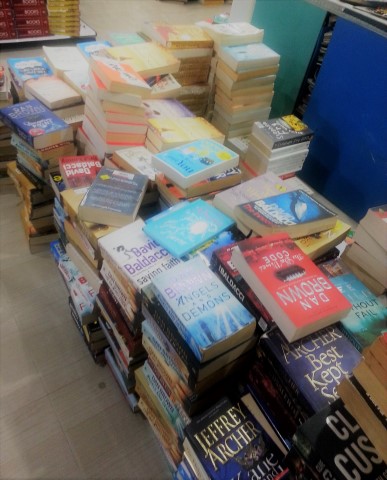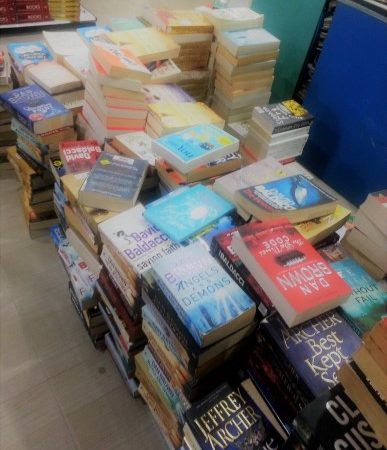
Only I would think about the books I read in January AFTER I finish writing a post about the books I read in February. I had not really thought of making this a book review site, but I figured I have to make a place for the books I read, somewhere. This seems just as cozy a place as any. So, expect to see something or the other related to books over the year!
January marked the beginning of my experimentation with a more structured form of reading. I am reading without biases, trying to delve into genres I had previously avoided. That experience has shown me how so much of our actions come from our past judgments. To go deeper into the shallow, beautiful, hollow, miserable self of mine – that is my aim this year. Books are helping me on that path.
| Books read in January | 10 |
| Number of pages | 2,414 |
| Average book length | 241 pages |
| Average rating | 3 |
| Highest-rated book/s | When Things Fall Apart by Pema Chodron |
Favorite Quote:
“Only to the extent that we expose ourselves over and over to annihilation can that which is indestructible be found in us.”
– When Things Fall Apart by Pema Chodron
Contemporary Fiction
1.The Wangs vs the World: Jade Chang
It had been a while since I had read an Asian book. Jade Chang writes of what is now the buzzword: immigrant experiences. The Wang family is on its way down and how! Somehow, this story of “poor little rich ones” didn’t strike a chord with me.
Non-Fiction
1.The Art of Loving: Eric Fromm
One of the seminal books on relationships and life, Eric Fromm writes of the aches and pains of managing our relationships. I can’t say I agreed with everything he wrote, but then, I don’t think he expects me to. Is Love an art? he asks. And then answers it beautifully:
“IS LOVE an art? Then it requires knowledge and effort. Or is love a pleasant sensation, which to experience is a matter of chance, something one “falls into” if one is lucky? This little book is based on the former premise, while undoubtedly the majority of people today believe in the latter.”
I know that love takes work. It takes a lot of courage. It takes us getting in touch with the deepest fears and to expose ourselves to our own vulnerabilities. Love is a word used too shabbily and discarded when it becomes uncomfortable. Fromm’s wise words are something we can all learn from.
2.The Happiness Track: Emma Seppala
Emma Seppala is one of the foremost researchers on the Art of Happiness. Years of research into the science of happiness has given this book a new light. One of the most important learnings for me from this book is when Emma urges us NOT to multi-task. I had always thought that the best way to be productive is to multi-task. But it has not been working for me. That and telling me to relax into wu wei or the art of just being. How simple. How profound. How very difficult to follow.
3.When Things Fall Apart: Pema Chodron
I would gift this book to everyone if I could. Pema Chodron’s years of Buddhist training shine through beautifully in this book. I am in the process of re-reading the book so that I can imbibe its wisdom better. Pema gives us what she calls as “heart advice for difficult times.”
I struggled with faith last year and running away from uncertainty has always been my “go-to” place. But Pema suggests every so gently to get in touch with our groundlessness and embrace uncertainty. This is a teaching that I need to learn from. I catch myself thinking: Let me just go back to my corporate job. But I know that is the fool’s way out. I know that clinging to what we think is secure is just nothing but clinging. I was reminded of how I told a person I knew last year that “you remind me of dangling on the edge of a precipice, holding on this one guy’s hand, petrified to let go because you think that you would not get anything else again.” How liberating it is if we do leap from that precipice. How feeble our soul feels when we enslave it to comfort.
Historical Fiction
1.The Underground Railroad: Colson Whitehead
The Book of 2016. No. That’s not based on my opinion, but probably every year-end book-summing-up article worth its name. This is an important book and I liked it well enough. But I found Jodi Picoult’s book on racism and slavery far more intriguing. Questions of race. Who would have thought we would be discussing this in the 21st century as well?
2.The Spy: Paulo Coelho
Ah! Coelho! What have you done? In re-creating the life of Mata Hari, you have created a mess. This was the worst book I read in January. I hate it when books assume knowledge on the part of the reader and plunge you straight into a world you know nothing of. I knew very little about Mata Hari, and Coelho wasn’t going to give me an introduction. Getting through the 208 pages of this was the achievement of the month for me.
World Literature
The Lake: Banana Yoshimoto
Banana Yoshimoto is one of my favorite Japanese authors. I had read her “Kitchen,” years ago and had been intrigued by her. The Lake is again a strange and melancholic novel, brimming with unsaid memories. Yoshimoto’s strength is in being understated. She draws pictures out of emotions. You need patience to get through this book. That and some wu wei.
Classics
The Swiss Family Robinson: Johann Wyss
This was the first non-Kindle book I read this year. How I loved getting back to holding a book in my hands! The Swiss Family Robinson is filled with adventure and a fair bit of faith. I loved the way the family proved itself resourceful to live on a deserted island, but after some time, all the killing of anything that moves proved a bit unpalatable. Having said that, this is still a classic. Deservedly so.
Indian Writing In English
The Association of Small Bombs: Karan Mahajan
My knowledge of Indian writing in English has suffered of late. I have been reading a lot of Contemporary Fiction. This was a highly acclaimed book and Karan Mahajan lives up to that acclaim. In India, we are immune to the loss of life. Lives become a matter of political concern only when the “death toll” crosses a certain number. We have been used in the past to bombs going off here and there. But what happens after the bomb? This is what Karan Mahajan explores. He has tried to be clever, giving us the viewpoint from the terrorist as well. I did wish I had had more insight into the terrorists, but the book still remains important on several levels.
Indian Translations in English
Ghachar Ghochar: Vivek Shanbhag
I discovered this book in my favorite second-hand bookstore, Bookworm, on Bangalore’s Church Street. Only later did I realize that it was an author-signed copy as well! It pains me that I can’t read in Kannada, my native tongue. Over the year, I am going to challenge myself by reading something in Kannada. Eloquent and descriptive, Ghachar Ghochar was a treat.







